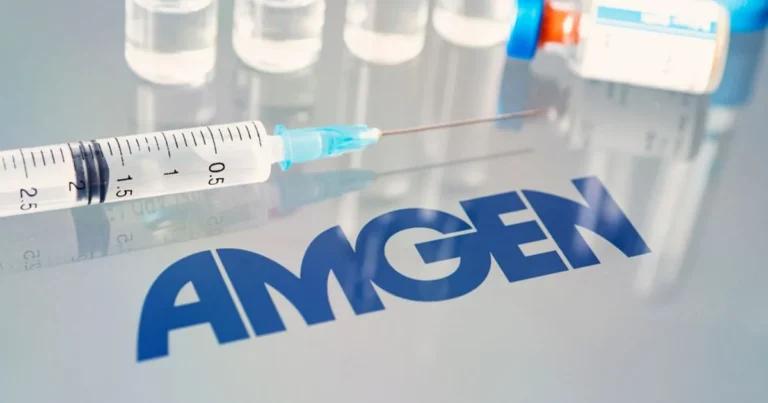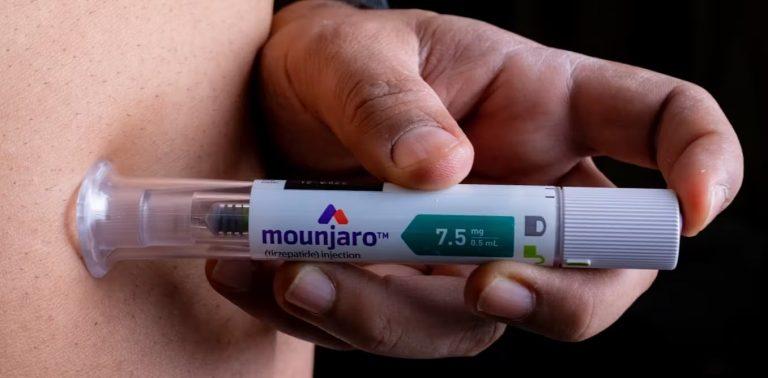The Phase II trial of the once-monthly weight loss drug Maridebart cafraglutide (Amgen), also known as MariTide or AMG133, shows high discontinuation rates, largely due to gastrointestinal side effects. This finding raises concerns about the drug’s viability despite its effectiveness in weight loss. This article explores the trial results, the reasons behind the high dropout rate, and what these findings mean for Maritide’s commercial future as a licensed weight management treatment.

Update on Phase II Trials for Amgen’s Once Weekly GLP-1 Injection MariTide
Key Takeaways
- The Phase II trial of MariTide revealed high discontinuation rates, particularly among participants without Type 2 diabetes, largely due to gastrointestinal adverse events, including nausea and vomiting.
- Participants who adhered to the treatment regimen experienced significantly higher weight loss (up to 19.9%), emphasizing the benefit of sustained adherence for effective weight management.
- Upcoming Phase III trials aim to further evaluate MariTide’s efficacy and safety, potentially positioning it as a groundbreaking monthly therapy for Type 2 diabetes and obesity management.
Phase II Trial Overview
The Phase II trial of MariTide included 592 participants, divided into two cohorts based on their Type 2 diabetes status, including a diabetes cohort. Cohort A consisted of participants without Type 2 diabetes, while Cohort B included those with the condition. This division allowed researchers to understand the drug’s effects on different populations, providing a comprehensive view of its efficacy.
Participants in Cohort A were assigned to various fixed monthly dose arms or dose escalation arms during the trial. The primary aim of the trial was to evaluate the efficacy of Maridebart cafraglutide, administered once monthly, in achieving significant weight loss. MariTide, administered subcutaneously monthly or less frequently, has shown potential in managing obesity by targeting glucagon-like peptide-1 (GLP-1) receptors.
The trial’s primary analysis focused on the effectiveness of different dosing strategies and their impact on weight loss outcomes. Understanding the pharmacokinetics low dose initiation and the achievement of three target doses were crucial elements of this mid-stage trial. As we move forward, the complete primary analysis provides valuable insights into the drug’s potential and the challenges it faces, including the option for a lower dose.
High Discontinuation Rates
One of the most significant challenges observed during the trial was the high rates of discontinuation, which significantly affected participant adherence and treatment effectiveness. Among individuals with obesity who received fixed doses of the drug without dose escalation, 12% to 27% discontinued the treatment early due to gastrointestinal side effects. In contrast, those in the dose-escalation groups experienced lower discontinuation rates from gastrointestinal adverse events, with rates up to 7.8%.
The primary reason for discontinuation was gastrointestinal side effects, notably nausea, vomiting, constipation, retching, and diarrhea. These events were most common early in treatment, especially without ramp-up dosing. However, introducing dose-escalation protocols (e.g., gradually increasing the dose over 4 or 12 weeks) substantially improved tolerability, reducing drop‑out rates.
Gastrointestinal Adverse Events
Gastrointestinal side effects in the Phase 2 MariTide Trial emerged as the most commonly reported adverse events. These included symptoms such as nausea, vomiting, diarrhea, constipation, and retching. The frequency and severity of these events varied depending on the dosing strategy used in the trial.
Participants who received fixed, higher doses of MariTide without a gradual increase in dosage experienced a higher incidence of gastrointestinal issues. In these non-escalated dosing groups, between 12% and 27% of individuals discontinued treatment early due to intolerable GI symptoms.
In contrast, when a dose-escalation approach was implemented, gradually increasing the drug dosage over time, fewer participants experienced severe GI reactions. This strategy significantly reduced the discontinuation rate, with only up to 7.8% of individuals stopping treatment due to GI side effects. These findings suggest that titrating the dose can improve the drug’s tolerability and support better adherence to the treatment regimen.
Impact on Weight Loss Outcomes

Impact of various weight loss strategies on overall outcomes.
The Phase II trial of MariTide demonstrated promising weight loss outcomes for participants. On average, participants lost 16.2% of their body weight, considering all enrolled individuals. This substantial weight reduction is a significant achievement in the context of chronic weight management, offering hope for individuals struggling with obesity.
Patients with obesity and Type 2 diabetes had an average weight reduction of 12.3% when including all participants. Among individuals who adhered to the treatment regimen, weight loss reached up to 19.9%. These results highlight the importance of adherence in achieving optimal weight loss outcomes and emphasize the need for strategies to support patients throughout their treatment journey in the obesity diabetes cohort, including further weight reduction.
The average weight loss for participants who discontinued was significantly lower, illustrating a direct correlation between adherence to treatment and effective weight management. The findings underscore the importance of a robust and sustained reduction in treatment for meaningful weight loss and long-term weight control, reinforcing the need for comprehensive support systems to optimize health outcomes and overcome a weight loss plateau.
Dose Escalation Strategies
Dose escalation strategies are essential in managing the adverse events associated with GLP-1 receptor agonists like MariTide. These strategies aim to improve the tolerability of the drug by allowing for a gradual increase in dosage. Proper management and early intervention for gastrointestinal adverse events can enhance treatment adherence and ultimately improve patient outcomes.
Key strategies for minimizing the impact and severity of GI AEs associated with GLP-1 RA therapy include:
- Educational initiatives directed at both healthcare providers and patients
- Implementing different dose escalation schedules to improve patient adherence and overall outcomes in weight management treatment
- Understanding the pharmacokinetics of low dose initiation and gradual increase to the target dose to optimize treatment results
Balancing the initial dosing with the achievement of target doses requires careful consideration and monitoring. This approach ensures that patients can tolerate the medication well while still benefiting from its weight loss effects. The success of dose escalation strategies highlights the importance of personalized treatment plans in achieving optimal health outcomes.
Safety and Tolerability Measures
Safety and tolerability measures are critical components of any clinical trial, and MariTide was no exception. The side effect profile of MariTide includes gastrointestinal issues, similar to other GLP-1 medications. Most gastrointestinal adverse events occurred during or shortly after the dose escalation phase, suggesting that the initial adjustment period is critical for managing these effects.
Monitoring safety data in clinical trials is essential for identifying frequently reported adverse effects associated with treatments. The primary goal of dose escalation strategies is to carefully balance patient safety while effectively determining the maximum tolerated dose of a drug. Optimizing gastrointestinal tolerability is a critical aspect of drug development to minimize discomfort and improve patient adherence, especially when considering escalating doses. Additionally, monitoring safety signals is crucial throughout this process.
Clinical trials often utilize specific measures to assess the impact of adverse events on participants’ overall health and treatment continuation. These pre-specified cardiometabolic measures help researchers understand the safety profile of the drug and make necessary adjustments to improve patient outcomes. The insights gained from these measures are invaluable in the ongoing development of effective and safe weight loss therapies.
Comparison with Other Weight Loss Medications
Comparing MariTide with other weight loss medications provides valuable context for understanding its efficacy and potential. In clinical studies, MariTide has shown an average weight loss of approximately 20% over 52 weeks for individuals with obesity or overweight. This performance is comparable to other medications like retatrutide, which has recorded weight reductions of up to 24.2% in similar groups.
CagriSema demonstrated a mean weight loss of 22.7% after 68 weeks in its trial, whereas MariTide’s performance is projected to potentially rival this based on ongoing evaluations. The differences in discontinuation rates between MariTide and other GLP-1 receptor agonists are notable, with approximately 65% of individuals without Type 2 diabetes discontinuing MariTide treatment within a year compared to around 47% for those with diabetes.
The side effect profiles of these medications share both commonalities and distinctions. Like MariTide, retatrutide was associated with gastrointestinal side effects; however, some individuals in the retatrutide trials also showed dose-related increases in heart rate. These comparisons help to clarify MariTide’s distinctive role among weight loss treatments and emphasize the need for continued research to enhance therapeutic effectiveness.
Next Steps for MariTide
MariTide will shortly enter Phase III clinical trial. This trial will involve a much larger group of participants over a longer period, providing a more comprehensive understanding of the drug’s efficacy and safety. The duration of the recently initiated Phase III MariTide studies is 72 weeks, allowing for extended observation and data collection.
Amgen’s goal for MariTide is for it to be the first monthly therapy for Type 2 diabetes, a significant milestone in the field of weight loss and diabetes management. The initial starting dose for patients in the Phase III MariTide studies is 21 mg, setting the stage for a rigorous evaluation of its effectiveness and safety.
The expected outcomes of these studies will be crucial in determining MariTide’s future marketability. The results from the phase III trials will inform regulatory decisions and potentially pave the way for MariTide to become licensed in the treatment of obesity and Type 2 diabetes.
Cardiometabolic Health Improvements
Beyond weight loss, MariTide offers promising cardiometabolic risk factors and health improvements. The drug lowered A1c levels by as much as 2.2 percentage points, significantly improving heart disease risk factors, including atherosclerotic cardiovascular disease. These changes are crucial for individuals with obesity and Type 2 diabetes, as they address both weight and metabolic health.
Improvements in lipid parameters were also noted, although they were less impactful, with only minor reductions in total cholesterol and triglycerides for each kilogram of weight loss. These findings highlight the multifaceted benefits of MariTide, emphasizing its potential to select lipid parameters and enhance overall health outcomes.
Amgen aims to leverage MariTide’s less frequent dosing schedule to enhance patient adherence and improve long-term health outcomes in chronic weight management and Type 2 diabetes. The potential for improvements in heart health, along with the significant weight reduction, underscores MariTide’s role in optimizing health outcomes for patients.
Expert Opinions
Experts in the field of obesity treatment have weighed in on MariTide’s potential. They suggest that MariTide’s potential for sustained weight loss without a weight plateau represents a significant advancement in obesity treatment. This perspective highlights the importance of MariTide’s unique dosing schedule and its impact on long-term weight control.
The significance of these expert insights cannot be overstated. Published in reputable journals like the New England Journal of Medicine, these findings lend credibility to MariTide’s potential. Experts emphasize that the drug’s ability to maintain a downward trajectory in weight loss over an extended period sets it apart from other treatments.
These expert opinions reinforce the promising future of MariTide in the landscape of weight loss medications. Their insights provide valuable context for understanding the drug’s potential and the importance of continued research and development.
Summary
The Phase II trial of MariTide has provided valuable insights into the drug’s potential for significant weight loss and its associated challenges. Participants experienced an average weight loss of 16.2%, with those adhering to the treatment regimen achieving up to 19.9% reduction in body weight. However, high discontinuation rates, driven primarily by gastrointestinal adverse events, posed a significant barrier to achieving these outcomes.
Dose escalation strategies were identified as crucial for managing these adverse events and improving patient adherence. The trial also highlighted the importance of safety and tolerability measures in optimizing treatment outcomes. Comparing MariTide with other weight loss medications underscored its competitive efficacy and unique dosing schedule.
Looking ahead, the Phase III trial will determine MariTide’s future and pave the way for licensing. The potential cardiometabolic health improvements reinforce the promise of MariTide in revolutionizing obesity and Type 2 diabetes treatment. As we await the results of the Phase III trial, MariTide continues to inspire hope for better weight management solutions in a convenient use format.
Frequently Asked Questions
What is the next step for the research on MariTide?
The next step for the research on MariTide is to conduct a phase 3 clinical trial involving a larger participant group over an extended timeframe. This advancement is crucial for validating its efficacy and safety.
In which journal has the research on MariTide been published?
The research on MariTide has been published in the New England Journal of Medicine.
What was the maximum weight loss observed for patients who completed the 52-week study?
The maximum weight loss observed for patients who completed the 52-week study was 19.9% for those with obesity and 17% for those with diabetes and obesity.
What were the reported side effects of MariTide?
The reported side effects of MariTide predominantly included gastrointestinal issues, particularly vomiting and diarrhea.
How does MariTide differ from other GLP-1 medications?
MariTide differentiates itself from other GLP-1 medications by using a monoclonal antibody formulation that permits monthly administration, as opposed to the more common weekly dosing schedule. This may provide added convenience for patients.
Medical Disclaimer
NowPatient has taken all reasonable steps to ensure that all material is factually accurate, complete, and current. However, the knowledge and experience of a qualified healthcare professional should always be sought after instead of using the information on this page. Before taking any drug, you should always speak to your doctor or another qualified healthcare provider.
The information provided here about medications is subject to change and is not meant to include all uses, precautions, warnings, directions, drug interactions, allergic reactions, or negative effects. The absence of warnings or other information for a particular medication does not imply that the medication or medication combination is appropriate for all patients or for all possible purposes.













